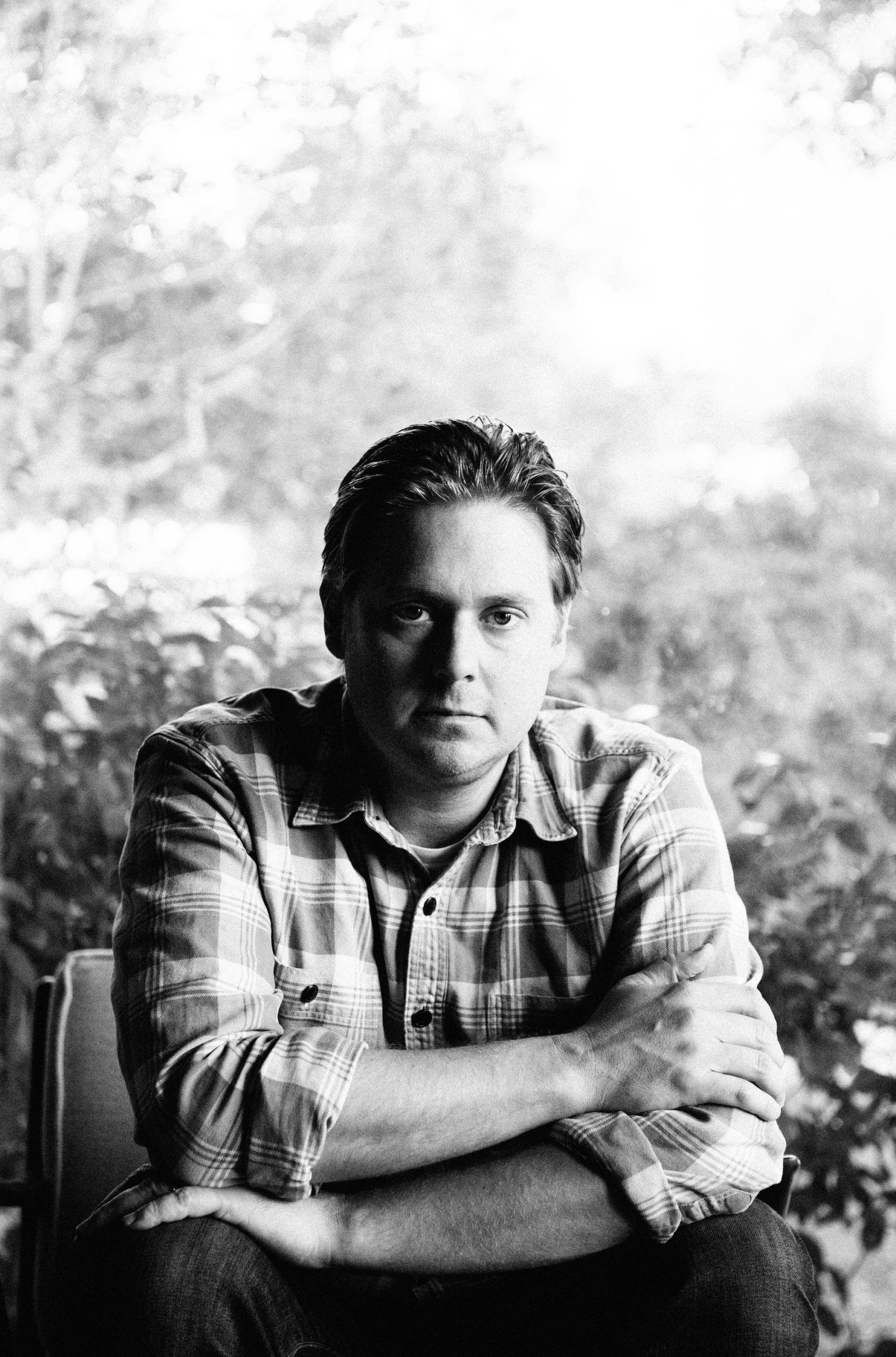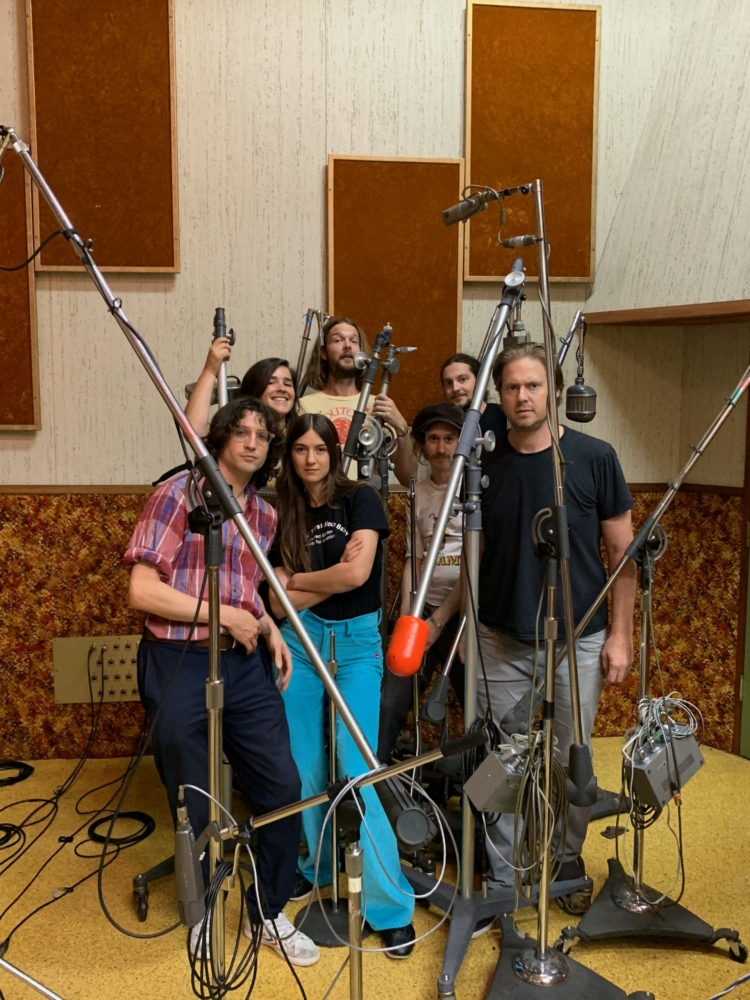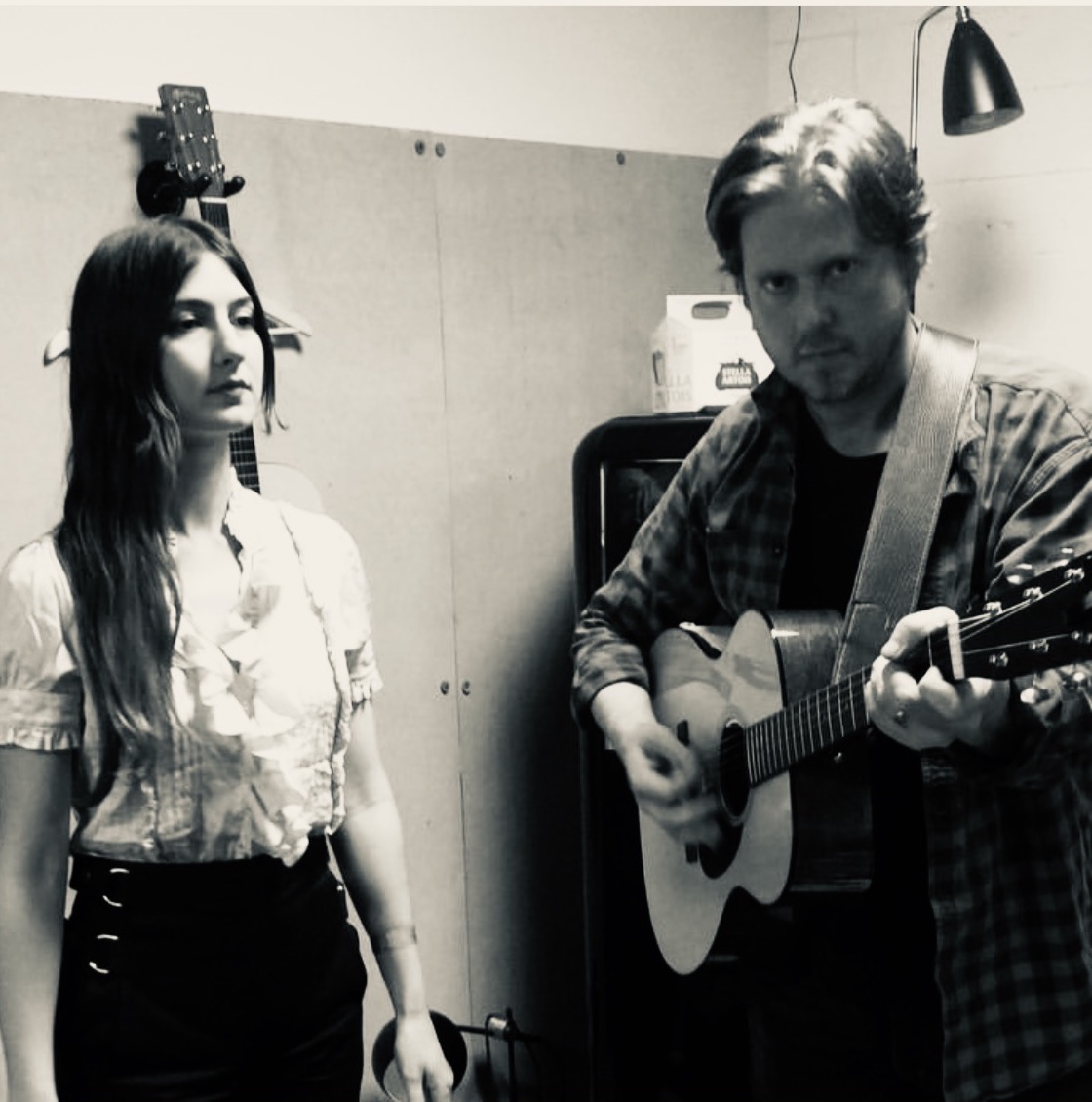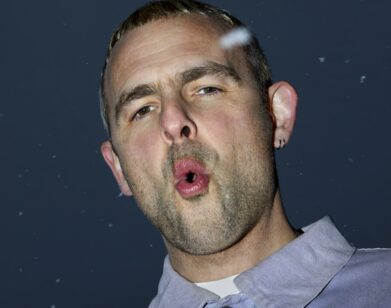in conversation
Tim Heidecker and Weyes Blood Talk About Everything and “Nothing”

Photo by Cara Robbins.
It’s become a bit of a cliché to claim someone predicted the unpredictable events of 2020. It’s only human, after all, when presented with the most cataclysmic, cruelly ironic, cable television-scripted version of reality to seek out our modern prophets who seemed to somehow see the chaos coming. Tim Heidecker doesn’t claim to be one, though he might as well. In early March, the comedian and musician, along with his partner-in-crime Eric Wareheim, spoke of Pork’s Disease, a mysterious swine-induced zoonotic disease, on the live tour for his cult Adult Swim series, Tim and Eric Awesome Show, Great Job! The last week of the tour, they got to Seattle and saw few laughs. Though the joke was particularly ill-timed (or well-timed, depending on who you ask), it’s the type of grim comedy that has served as the bedrock of Heidecker’s career, even as he transitioned to music. 2016’s In Glendale marked the comedian’s embrace of the form with songs like “Cleaning Up Dog Shit” and “I Saw Nicolas Cage.” In 2017, he released Too Dumb for Suicide, a collection of “Trump songs” like “Imperial Bathroom” and “For Chan.” On last year’s What the Brokenhearted Do…, whose cover featured Heidecker’s face with a single blue teardrop, Heidecker drove further into the void, imagining a fictional divorce from his wife and the ensuing existential crisis.
His latest, Fear of Death (Spacebomb Records) is a reckoning of sorts, leaving behind the jokes to examine the looming specter of mortality and the questions that come with it. With a happy tambourine and Lady of the Canyon backing vocals from Natalie Mering, who goes by the musician’s moniker of Weyes Blood, Heidecker has crafted a sunny, psychedelic record that looks death in the eye and hums right along to it. He describes one track, “Nothing,” a Lennon-lifted piano ballad, as a “religious song for agnosticism,” a nihilist’s anthem with sparks of redemption. (The duo’s folky cover of “Let It Be” brings hippie-existentialism to the whiskey-stained saloon.) At a time when the search for meaning has become as commonplace as the hunt for hand sanitizer, it’s Heidecker’s embrace of nothingness that rings more profound than hollow quotes and Instagram captions. Like Harold faking his death to the cue of Cat Stevens in Harold & Maude, Heidecker pushes toward feeling until the pain becomes something like pleasure. And in that, he finds life. Below, Heidecker catches up with Mering from his garage studio to discuss facing your fears and reading the news when it sure looks bad. —SARAH NECHAMKIN
———
NATALIE MERING: How’s Zoom life? Is this your third Zoom of the day?
TIM HEIDECKER: It’s my second.
MERING: Wow. I was just kidding.
HEIDECKER: I was on another service called BlueJeans. Then I did another one the other day with Google Meet-ups.
MERING: Wow. Have you done Microsoft Meets?
HEIDECKER: No.
MERING: That one’s weird. I tried to sign into it and I couldn’t get it working, and I got ex-communicated from the Microsoft Meet. Are we just chatting?
HEIDECKER: Well, you’re supposed to interview me, but…
MERING: Oh. I didn’t know that!
HEIDECKER: It’s called Interview Magazine. I’ll help you.
MERING: I can spontaneously figure it out.
HEIDECKER: They’re recording it, so then they just transcribe it and make it all sound like we’re smart.
MERING: Okay, okay. So Tim, how does it feel putting out music during this time?
HEIDECKER: I’m relieved a little bit, because I don’t have to do the normal things.
MERING: Like play shows?
HEIDECKER: Like play shows and go on talk shows and do those kind of things. I mean, I know I’d like to do those things, but they’re also scary and hard. There’s a part of me that’s always kind of liked when things go to hell, because it gets me out of work.
MERING: It’s true. What do you feel like playing a show versus doing a comedic performance? Do you feel like playing a show is harder?
HEIDECKER: It’s much harder. I mean, people don’t really want to go see me play music as much as they want to go see me do comedy, you know? I’m aware of that.
MERING: Maybe until they hear this record.
HEIDECKER: Well yeah, we always are hoping for the best, but then there’s always that audience member who’s like, “Are we waiting for the jokes?” It’s like, “Calm down, it’s not going to be that kind of night for you.” I find it a little embarrassing to play music in front of people.
MERING: It is a weird muscle that you kind of have to work over many years to feel totally comfortable with.
HEIDECKER: Do you close your eyes when you perform and sing?
MERING: Totally. I have weird out-of-body experiences sometimes when I play that are actually really terrifying because I’ll just forget where I am, forget what I’m doing, forget what I’m singing. That still happens to this day.

Photo courtesy Spacebomb Records.
HEIDECKER: Yeah, I feel like I just have to close my eyes, like I’m going down a water slide or something. Just roll through this. I can’t do that thing where I look at people and make eye contact and stuff.
MERING: It’s definitely really intense. So I never actually asked you this question, this is a good question. Now that the record has kind of simmered in your mind for quite some time, which song is kind of the slow burn—maybe the one that you liked a lot, but now you like it even more?
HEIDECKER: I’m really excited for people to hear “Nothing,” the first single. It’s a little misdirect, because the record doesn’t really sound like that song.
MERING: Yeah, that’s an outlier.
HEIDECKER: I think we’re going to surprise people. I hope.
MERING: How do you feel about the lyrical content of “Nothing,” now that everything has become so… how it’s so much more important now to establish some sense of meaning and purpose?
HEIDECKER: It is weird, because it’s a very selfish song. It’s very much just about…
MERING: Shellfish shong.
HEIDECKER: Shellfish shong. The shellfish song.
MERING: The clam song.
HEIDECKER: It’s a selfish song. That is kind of a tongue-twister. It’s about me and my own personal experience going through my career right now, or at that time last year. It does take on a more grim tone in the context of the world we’re living in now.
MERING: And also maybe not. Maybe there’s some redemption hiding in there.
HEIDECKER: I described it to somebody as a religious song for agnosticism. It’s like, there is no real point. There’s no real reason to do anything except to… I don’t know. You could dwell on that for as long as you want and it doesn’t really get you very far. When I write music, that’s just the thing I was thinking about that day. And so, you end up committing to this recorded piece of music that needs to be your overarching philosophy of everything—well no, that’s just the way I was feeling that day. Do you find that you have to own some of the things you sing about so strongly?
MERING: Yeah, definitely, especially if you’re repeating them every night, because I think your subconscious listens to what you speak. I definitely feel like I’ve reinforced certain messages from singing certain songs over and over again, and they’ve also taken on new meaning and been like an exorcism, finally getting rid of that after singing it for so long. It’s a cathartic process. I actually think a lot of the tracks on the record are actually really relevant to stuff that’s going on now, strangely. They’ve become more relevant with time.
HEIDECKER: I’m working on this song now. I don’t know if I’ll ever do anything more with it, but it just popped in my head. The line starts with, “I’m going to get bashed in the head with a baseball bat, I won’t hear the crack as the world turns black and I fall flat.”
MERING: Whoa.
HEIDECKER: Isn’t that nice? But also, it’s almost like a Nick Cave murder ballad or something like that. Maybe I’ll write a song that’s from the perspective of a guy who’s predicting that he’s going to get killed by somebody.
MERING: [Singing] Bang, bang, Maxwell’s silver hammer came down upon her head…
HEIDECKER: [Laughs] Exactly.
MERING: I want to ask some juicy questions that aren’t completely related to the record. I think this is so interesting: the recent Tim and Eric Live Show included a huge portion dedicated to the Pork Disease.
HEIDECKER: Pork’s Disease, yes.
MERING: Pork’s Disease is a zoonotic disease, which is exactly what happened after you guys toured. When you were coming up with that, were you just like, “Yeah, inevitably we’re going to deal with another zoonotic situation”? Were you psychic?
HEIDECKER: I think it’s always just about me making Eric laugh or Eric trying to make me laugh and there’s probably a text in here from me to Eric, like “How about Pork’s Disease?” What does that mean? Nothing, but it makes him laugh because it’s stupid. There was no talk of corona at all during the writing of this show, but as the tour was coming towards the end, it got more and more uncomfortable to do that last bit. For people that didn’t see the show, it was basically this idea that I had contracted Pork’s Disease and I had exposed the audience to the disease and we had to quarantine. I think we literally said, “We have to quarantine the theater, no one can leave.” It really didn’t hit until the last week, and we got to Seattle and it was like “Oh, there’s cases here in Seattle.” This was early March.
MERING: Wow.
HEIDECKER: I remember making one joke, which was, “Yeah, we tried calling the CDC, but apparently they’ve got their hands busy right now,” and there were no laughs. People were like, “This is real.”

Photo courtesy Spacebomb Records.
MERING: When writing this record, you would text me lyrics spontaneously. Is that something you experience all the time, where you’re constantly writing, or do you go into music mode when you’re inspired to? Are you a songwriter, or are you somebody that makes albums and gets into it when you’re into it?
HEIDECKER: That’s a good question. You’re very good at this, by the way, coming up with no prep. I’m impressed. I definitely gear up into more productive songwriting when I have a project in mind or I have an idea of what I want to do, and then there’s a bit of workmanship to it, I guess, where you sit down and have a grain of an idea and work on it for a while, but I try to stay open to ideas, like this stupid thing about getting whacked in the back of the head. I recorded a little 10 minute jam on it, just to have. And then I’ll have files that are just voice memos or notes of lyrics and stuff that are just hanging out there and aren’t really finished.
MERING: Do you want to make your Pet Sounds losing-your-mind experimental album?
HEIDECKER: I don’t think I’m much of a musician in that way.
MERING: You can’t take a dead fish and record you slamming it on the counter or something?
HEIDECKER: Put the sandbox in my living room.
MERING: Well, actually, Scott Walker did the fish thing, that wasn’t Brian Wilson. But it’s all the same wheelhouse of genius, you know?
HEIDECKER: People still ask, “Why does the record sound like the ’70s?”
MERING: Because you’re from the ’70s. That’s when you’re born.
HEIDECKER: Well, that’s a good point, but I’m not trying to sonically expand anything.
MERING: I actually think the ’70s are still here, it’s just there’s a couple more layers of weird paint on top of it. Even though I wasn’t born during the ’70s, I still feel ’70s because my parents were so ’70s. What did your parents listen to?
HEIDECKER: A lot of Simon and Garfunkel, a lot of Cat Stevens…
MERING: I can hear the Cat Stevens thing.
HEIDECKER: I love Cat Stevens, Tea for the Tillerman and Teaser and the Firecat. My dad loved Led Zeppelin but also Joni Mitchell; the Blue record we listened to a lot. The Beatles, the Stones, a lot of oldies. Oldies but goldies. Remember the oldies but goldies?
MERING: Yeah. It’s weird, you can turn on the radio, and there’s no more oldies stations, except on AM. They’ve demoted oldies.
HEIDECKER: The classic rock station now is playing ’90s.
MERING: Nirvana, Pearl Jam. Well, separate from your influences, you were in bands as a young guy and you played shows for a long time. What were your early music projects like?
HEIDECKER: I had a funny band called Shaggy’s Belt Buckle. That was very embarrassing.
MERING: Scooby Doo! That’s kind of badass, because you can’t see his belt buckle. It’s hiding under his weird long shirt.
HEIDECKER: I’ve never thought of that, that’s true. We were inspired by the Beatles song “You Know My Name, Look Up the Number.” That was our humor. It was folky, kind of British, stupid. I also had a musical theatre side.
MERING: Interesting. What were your plays?
HEIDECKER: I was in a lot of them—The Music Man, A Christmas Carol, this play called 1776. I was in a really cool production of Grapes of Wrath.
MERING: No way.
HEIDECKER: It was an adaptation, and they had a character who was a folk singer, kind of like a Woody Guthrie type. And that was my role, I was the narrator. It wasn’t high school theatre, it was community theatre. It was a little more advanced.
MERING: Wow. Did you kind of just slay those high school productions? Could people tell that you were a performer, that you had something going on?
HEIDECKER: I was so good that I didn’t even do the high school productions.
MERING: So now, flash forward to Fear of Death. If your high school self came and sat in on that session and listened to that record, what would he feel? Would he cry?
HEIDECKER: You’re going to make me cry. I think I would be really impressed that we’re operating at a such a high level of professionalism. The playing on the record—none of it’s mine, it’s just other people that are so good that we’re lucky to have.
MERING: But it is your songs.
HEIDECKER: The years since I put out In Glendale in 2012 have been me warming up to the idea that I can write about things and they don’t have to be a total goof. They can be about what I’m thinking about at that moment, and people are going to have to get used to that.
MERING: Do you think the world is going to open back up again? And what is it really going to look like? Do you feel like, in a way, the marginal artists of the world are being harvested by the grim reaper?
HEIDECKER: A little. I don’t know. What was already happening is that there’s massive things like Star Wars and then there’s very small things that people make and raise money for on their own and there isn’t a middle class of content. I’m not working on the movie from The Rock or the new Aquaman movie. There are always these projects that are right on the bubble that we’re very thankful that we get to do, but they could go away, and it would make people’s lives easier a lot of times. I’ve been trying to use my time wisely. You know what? I should just be happy. I should have this constant desire to be in front of the camera. But there is that crazy itch that I think we all have of, is this it for me, am I done? Is it curtains for my career? Am I irrelevant? But I think everybody has that. Unless you’re insane.
MERING: Maybe I’ll try to end on a happy note. We just talked about the reality of the world, music’s saving grace. What, besides your own record, has been the 2020 music that has kept you going through quarantine?
HEIDECKER: Well, I’ve been working on my daughter. She’s going to be seven, so I’ve got her into the song “California” by Joni Mitchell. And she’s now requesting that on the playlists for our drives.
MERING: [Singing] Sitting in a park in Paris, France…
MERING & HEIDECKER: [Singing] Reading the news and it sure looks bad.
HEIDECKER: They won’t give peace a chance, that was just a dream some of us had.
MERING: That was just a dream some of us had.




